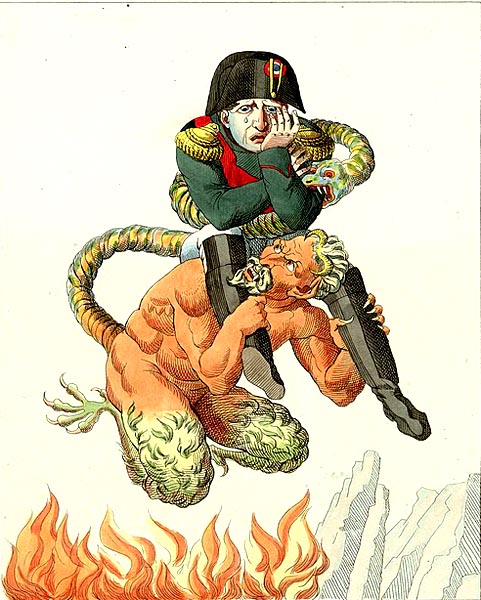 |
| Political cartoons often use visual metaphors. Here, Napoleon is supported by the devil. (Wikipedia) |
Note: Similes and metaphors (and other figures of speech) can make your expression more colorful, whether you're a preacher, a poet, or a politician! (Alliteration!)
Get Ready: Do you know the difference between a simile and a metaphor?
Last time I mentioned that one website lists over 115 kinds of figures of speech. I said then that some were very common, but had uncommon names. Others are well known. We'll look at both types today.
Some figures of speech have beautiful, hard-to-pronounce names. Few native speakers know these words, though we often are familiar with the phenomena they describe.
Take, for example, antonomasia. This the substitution of a phrase for a proper name, or vice versa. Calling Shakespeare "The Bard" or a king "Your Majesty" is antonomasia. So is saying of a friend, "He's no Einstein," instead of "He's not a smart person."
Paraprosdokian is another unfamiliar word, but a common figure of speech. Paraprosdokian uses a "twist" at the end of a sentence or phrase. A common one is, "When the going get tough, the tough go shopping." (We expect to hear, "... the tough get going.") Whenever you are set up to expect something, and hear something different, you've found a paraprosdokian: "She moved across the room gracefully, smiled at me delightfully, and slapped my face." Paraprosdokian can often be used for humorous effect.
Now let's look at the two "classic" figures of speech, the ones every teacher loves to talk about. Reciting from my school days:
"A simile compares two or more things using 'like' or 'as'; a metaphor does the same without 'like' or 'as.'"
Is that clear?
"Run like the wind," "eat like a horse," "drive like a maniac": These are all similes. But to say of a person who eats a lot, "He's a horse," or to say of a fast driver, "He's a maniac": those are metaphors.
Use of simile and metaphor can add interest to your speech. However, beware of clichés. These are over-used figures of speech that add little or nothing to what you say. Virtually all the similes and metaphors I've given are clichés. See the practice to try something new.
And avoid clichés like the plague!
--------Read more:
Practice: Let's make new similes to replace clichés. Match the first half of the simile with some new endings.
Here are three clichéd similes:
- run like the wind
- eat like a horse
- drive like a maniac
Which of the following is a good ending for:
- run like . . .
- eat like . . .
- drive like . . .
- a brush fire
- you're on the way to the hospital
- a man leaving a burning building
- you're in a high speed chase
- a shark
- you're tired of living
- a kid after school
- a dieter on holiday
- an Olympian
Now try making some of your own!
Answers are in the first comment below.
Submitted to the Shenzhen Daily for October 29, 2007
This lesson received 2619 visits on my old site between February, 2012, and June, 2021.


Answers to the Practice: 1. c, g, i; 2. a, e, h; 3. b, d, f
ReplyDelete